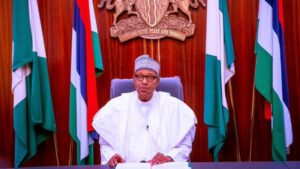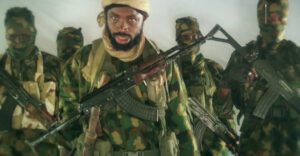In the immediate aftermath of the gruesome killing of no fewer than 43 compatriots last week in Borno state, an old video of President Muhammadu Buhari discussing Boko Haram surfaced. Apparently recorded sometime before the 2019 general elections, his interviewer, a foreigner, had sought to know if the prevailing insecurity would allow for elections in, especially Borno. President Buhari had brusquely replied that if elections could hold in strife-torn countries such as Afghanistan, Syria, and the likes, why would anyone suggest otherwise when it concerned Nigeria.
Seemingly unconvinced by the president’s retort, the interviewer had pressed on, asking how elections could be held in Boko Haram-held territories. For answer, President Buhari, ever laconic, stated that if elections held in Borno in 2015, when the insurgents were in control of about 21 local government areas, why won’t it now, when the group had been sufficiently ‘degraded’. He then left the hapless interviewer and moved towards his car.
But apparently feeling unsatisfied with the answer, the journalist pushed through the horde or persons surrounding the president, and threw one last question,’…but Haram Haram claim that…’, to which President derisively shot back:”Who is Boko Haram?”
In deed, as I reflect upon the almost daily loss of lives – which are callously added to the statistics – to the senseless carnage that the insurgents wrought, I cannot but ask, like Mr. President, really who, and what, is Boko Haram?
Perhaps, the answer to this intractable poser could be located within the same prism as the condensing trifle, ‘who is the Presidency?’ whose copyright belongs to Babachir Lawal, erstwhile Secretary to the Government of the Federation, SGF.
Besides the anticipated one-minute silence gratuitously observed by the nation’s parliament, and the promise never to allow a recurrence by the presidency in successive condolence messages, what really seems to irk many Nigerians is how the war against terror is being prosecuted.

Top on the list of their worries is the seeming resolve of the President to sink, rather than swim, with the entire top echelon of the country’s security apparatus.
Barely six weeks after assuming office, Buhari had on Tuesday, July 13, 2015 appointed the current service chiefs, and the National Security Adviser, NSA. And ever since, they have remained glued to their respective positions, going about the task at hand in an apparent cavalier manner of business-as-usual.
Signs that the Boko Haram menace would remain with us for a long while emerged, when barely six months into the administration, the security brass hats goaded President Buhari into prematurely declaring victory over the group.
Speaking in a December 24, 2015 interview with the British Broadcasting Corporation, BBC, the president had said that Nigeria had ” technically won the war” against Boko Haram.
To be charitable, one would only state that the president merely exaggerated the scale of initial successes recorded by the nation’s military. But can anyone now vouchsafe for a military that, six years after, remain mired in a war it long declared victory?
For me, quite unlike many commentators on the issue, the road to getting our country out of the current quagmire does not lie in the pacifist tokenism of changing the service chiefs; it instead, revolves around the central issue of policy governing the war.
As far back as 11 years ago, when the full-scale war against the sect began, it has been one long circus, which has seen several administrations and service chiefs come and go, yet Boko Haram subsists. In fact, it appears to grow in impunity with the coming of a new set of service chiefs.
With the coming of the Buhari government, himself being a former Army general and ex-Head of State, many had anticipated a positive change in strategy and a swift victory over the insurgents.

But as far as anyone can see, between the government and the sect, it has been a game of wits, in which the insurgent group appears to be dictating the pace.
Take the rudimentary case of personnel recruitment for example. While Nigeria recruits combatants on a yearly basis, Boko Haram does almost daily. While new Nigerian recruits are trained in all spheres of military duty, BH is essentially a fighting force; while Nigerian recruits pray not to be posted to Borno and other theatres of war, enthusiastic BH converts struggle to get to the front lines, if for nothing else, to prove a commitment to their warped cause.
Furthermore, while Nigerian soldiers grudgingly head to the battlefields, because they are there in the first place because of lack of job opportunity elsewhere, BH warriors revel in the ideological philosophy (whatever it is) that propel their cause.
Also, while supplies, including water and ammunition, is rationed among Nigerian soldiers, BH warriors have a surfeit of basic necessities, including having to adorn their bodies with intimidating rounds of ammunition.
Above all else, while our soldiers are poorly remunerated, BH is heavily funded by proceeds from kidnap and illicit external financial support…and wait for this, the promise of bliss in al jannah, with several virgins ministering to their erotic desires. Now, don’t ask me the veracity of this claim, as I am yet to visit the hereafter. Yet, one thing is sure, such tales, and the belief of the converts in them, help elevate their murderous cravings.
Thus, instead of dissipating energy debating the sack or retention of the military top brass, what, to my mind, we ought to be interrogating is whether we, as a government and a people, are desirous to really end the Boko Haram menace.
If the answer is in the affirmative, then why is it that thus far, there has not been any high profile arrest of either top commanders and sponsors of the group? Why has there not been any successful prosecution of any member worth his name in the group? Why is there no discovery, and/or blocking of funding sources, leaving the group with a ceaseless flow of resources?
Why, also, are ‘repentant’ Boko Haram operatives sheltered in fancy accommodations, and victims of their ignoble campaign left to grit through life in nondescript internally displaced persons, IDP camps? And why is it appropriate to sanction soldiers who complain of poor welfare and military weaponry, while general amnesty is granted the aggressors.
Perhaps, the answer(s) to these posers lie in examining the denotative meaning of Buhari’s stance when then President Goodluck Jonathan, in 2014, declared a military offensive against the sect. “The military offensive against Boko Haram (is) anti-North”, Buhari had said shortly before he became Nigeria’s president.
Now, while it is debatable if the President still holds onto such view, one fact that remains germane in all of this is, ‘no one should wilfully reinforce failure.’ The nation’s strategies against Boko Haram are not working.
And the time for genuine introspection is now.